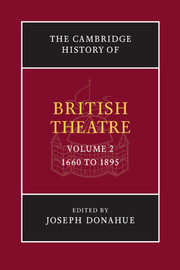Book contents
- Frontmatter
- Part I 1660 to 1800
- Part II 1800 to 1895
- 11 Introduction: the theatre from 1800 to 1895
- 12 Presence, personality and physicality: actors and their repertoires, 1776–1895
- 13 Theatres, their architecture and their audiences
- 14 Stage design from Loutherbourg to Poel
- 15 Theatre and mid-Victorian society, 1851–1870
- 16 Gendering Victorian theatre
- 17 Popular entertainment, 1776–1895
- 18 The Bells: a case study A ‘bare-ribbed skeleton’ in a chest
- 19 The new drama and the old theatre
- 20 1895 A critical year in perspective
- Bibliography
- Index
- References
15 - Theatre and mid-Victorian society, 1851–1870
from Part II - 1800 to 1895
Published online by Cambridge University Press: 28 March 2008
- Frontmatter
- Part I 1660 to 1800
- Part II 1800 to 1895
- 11 Introduction: the theatre from 1800 to 1895
- 12 Presence, personality and physicality: actors and their repertoires, 1776–1895
- 13 Theatres, their architecture and their audiences
- 14 Stage design from Loutherbourg to Poel
- 15 Theatre and mid-Victorian society, 1851–1870
- 16 Gendering Victorian theatre
- 17 Popular entertainment, 1776–1895
- 18 The Bells: a case study A ‘bare-ribbed skeleton’ in a chest
- 19 The new drama and the old theatre
- 20 1895 A critical year in perspective
- Bibliography
- Index
- References
Summary
In a formation that has rapidly become canonical in British historiography, the mid-Victorian years — from 1851 to 1870 — were an ‘age of equipoise’: a collective sigh of relief at having safely negotiated the landmines of electoral reform, Chartist agitation and revolutionary phobia. As the historian Thomas Babington Macaulay wildly and, as it turned out, accurately prophesied, 1851 – the year in which the Great Exhibition opened at the iron and glass Crystal Palace in London’s Hyde Park — would ‘long be remembered as a singularly happy year of peace, plenty, good feeling, innocent pleasure and national glory’. Although the mid-Victorian period lacked the sharp social and political contrasts of the 1840s and 1880s, it was nonetheless a crucial period in British history, because it provided a moment of respite in which the nation could pause to consolidate and savour its economic prosperity, technological modernity and political serenity. From the new perspective of the Crystal Palace, a dream of social order founded on respectability at last seemed possible. And leisure pursuits, one of the prized benefits of economic prosperity, were a prime area for achieving and advancing social harmony and intellectual enlightenment.
This chapter explores how the theatre made a bid for respectability,that most cherished of nineteenth-century virtues. Yet the exploration is not straightforward. Indeed, my central claim is that the mid-Victorian theatre both embraced and resisted the dominant middle-class goal of respectability — for the theatre as a cultural institution, for the acting profession and even for the social standing of theatre audiences. Just what the mid-Victorians meant by ‘respectability’ was always a bit unclear, even to them.
- Type
- Chapter
- Information
- The Cambridge History of British Theatre , pp. 331 - 351Publisher: Cambridge University PressPrint publication year: 2004
References
- 1
- Cited by



